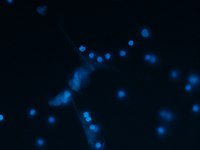
Photo from wikipedia
Innate immune cells are an essential part of the host defense response, promoting inflammation through release of proinflammatory cytokines or formation of neutrophil extracellular traps. While these processes are important… Click to show full abstract
Innate immune cells are an essential part of the host defense response, promoting inflammation through release of proinflammatory cytokines or formation of neutrophil extracellular traps. While these processes are important for defense against infectious agents or injury, aberrant activation potentiates pathologic inflammatory disease. Thus, understanding regulatory mechanisms that limit neutrophil extracellular traps formation and cytokine release is of therapeutic interest for targeting pathologic diseases. Activated protein C is an endogenous serine protease with anticoagulant activity as well as anti‐inflammatory and cytoprotective functions, the latter of which are mediated through binding cell surface receptors and inducing intracellular signaling. In this review, we discuss certain leukocyte functions, namely neutrophil extracellular traps formation and cytokine release, and the inhibition of these processes by activated protein C.
Journal Title: Journal of Leukocyte Biology
Year Published: 2018
Link to full text (if available)
Share on Social Media: Sign Up to like & get
recommendations!